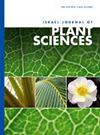Evaluation of morpho-physiological and biochemical indicators of salinity stress in Argemone mexicana L., medicinal plant from Papaveraceae
IF 0.7
4区 生物学
Q4 PLANT SCIENCES
引用次数: 0
Abstract
Abstract Plant growth is significantly impacted by abiotic stress factors including soil salinity and plants do have different mechanism to nullify the effect of these stresses. The current study is to understand the various physio-biochemical characteristics of Mexican prickly poppy ( Argemone mexicana L.), a medicinally valued species belongs to poppy family under different saline conditions (0 mM, 100 mM, 200 mM and 300 mM) to investigate the mechanisms underlying salinity tolerance. The results showed that salinity caused a negative impact on number of leaves, stomatal index and chlorophyll content in plants. Decreased chlorophyll content suggests a decline in photosynthetic rate. The concentrations of stress specific amino acid proline, soluble sugar sucrose, and secondary metabolite phenol were increased in plants treated with increasing concentrations of NaCl solution. Sucrose helps to protect the isolated chloroplast from damage caused by salinity stress. The degree of bleaching seen in the leaf disc assay was an indication of the damage caused by stress. These findings indicated that higher proline, sugar, and phenol content could be the key factors, which offer advantage to Argemone under saline conditions.罂粟科药用植物银莲花盐度胁迫的形态生理生化指标评价
植物的生长受到土壤盐分等非生物胁迫因素的显著影响,植物有不同的机制来抵消这些胁迫的影响。本研究旨在了解罂粟科药用植物墨西哥多刺罂粟(Argemone mexicana L.)在不同盐度条件下(0 mM、100 mM、200 mM和300 mM)的生理生化特性,探讨其耐盐机制。结果表明,盐度对植物叶片数、气孔指数和叶绿素含量均有负面影响。叶绿素含量降低表明光合速率下降。随着NaCl溶液浓度的增加,胁迫特异性氨基酸脯氨酸、可溶性糖蔗糖和次生代谢物苯酚的浓度增加。蔗糖有助于保护分离的叶绿体免受盐胁迫造成的损害。在叶盘试验中看到的漂白程度是由胁迫引起的损害的指示。这些结果表明,较高的脯氨酸、糖和酚含量可能是关键因素,这些因素在盐水条件下对Argemone有利。
本文章由计算机程序翻译,如有差异,请以英文原文为准。
求助全文
约1分钟内获得全文
求助全文
来源期刊

Israel Journal of Plant Sciences
生物-植物科学
CiteScore
1.90
自引率
0.00%
发文量
17
审稿时长
>12 weeks
期刊介绍:
The Israel Journal of Plant Sciences is an international journal of extensive scope that publishes special issues dealing with all aspects of plant sciences, including but not limited to: physiology, cell biology, development, botany, genetic
 求助内容:
求助内容: 应助结果提醒方式:
应助结果提醒方式:


